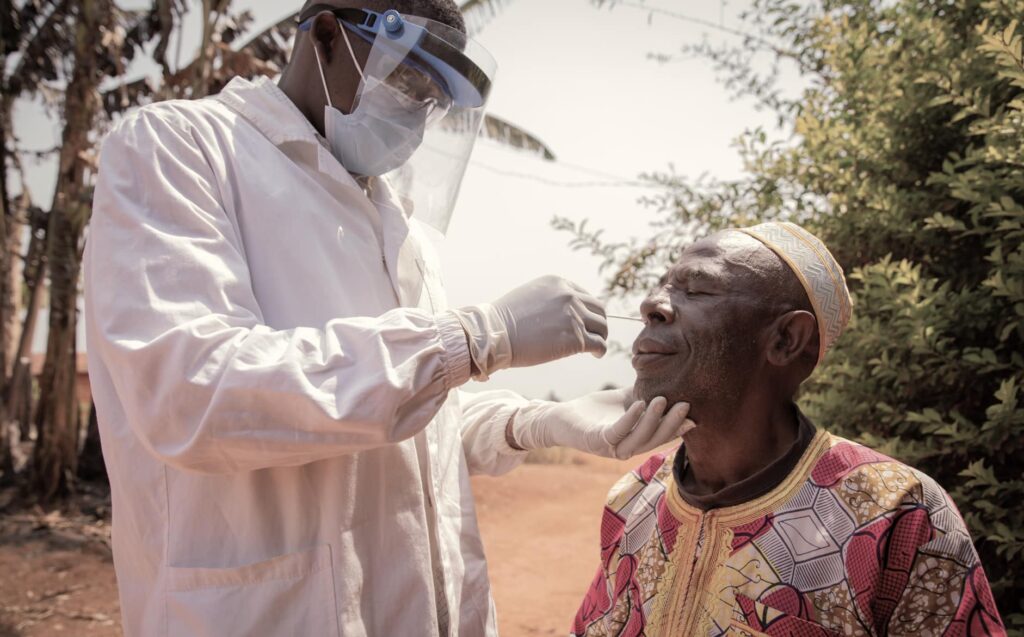The second phase of the COVID-19 Transparency and Accountability Project (CTAP) focused on deepening transparency and social accountability in the use of COVID-19 resources. The project also deepened conversations on the issues of health sector accountability in focus countries to mobilize the government and civil society organizations toward co-creating strategies for strengthening health systems. Through CTAP, we created a coalition of media and civil society organizations across Africa specifically to enhance the advocacy for improved health sector investments and frameworks that deepen transparency and accountability in the health sector. The first phase of the project was executed in seven countries. Subsequently, we expanded the scope of execution to nine countries, namely, Nigeria, Ghana, Liberia, Sierra Leone, Senegal, Cameroon, Kenya, Malawi and Zimbabwe.
We also assessed the capacity of Primary Health Care Centers across Africa to understand the progress, challenges and interventions needed. In Nigeria, CODE and BudgIT held sessions with the Nigeria Center for Disease Control (NDDC) and the National Primary Healthcare Development Agency (NPHCDA) on improving healthcare at the community level. A PHC summit was held in Nigeria, and online advocacy has been ongoing to ensure that the government honours its promise of making primary health care accessible to citizens. In Nigeria, a significant partnership has been struck with the NPHCDA (National Primary Health Care Development Agency), and different engagements have been held with the leadership on various issues revolving around primary health care. In Cameroon, our team met and engaged the Coordinator of the National Governance Program (NGP) for conversations on how Cameroon can meet the eligibility for the Open Government Partnership. In Kenya, we had a webinar during the Open Government Week to broaden the OGP reach within the country.
The COVID-19 Transparency and Accountability Project (II) recorded impact which includes;
Building Long-term Country-wide framework for Health Sector Accountability
Through CTAP, we have deepened civil society coalitions, and partnerships with the media, the government and relevant stakeholders in focus countries. For context, in Senegal, the Ministry of Budget and National Planning promised to partner with us on improving access to information on healthcare. Likewise, in Nigeria, we partnered with the National Primary Healthcare Development Agency (NPHCDA) to transform primary health accountability. We have also built a network of 217 organizations interested in leveraging their constituency to advocate for the efficient usage of public resources across Africa.
Engagement with the Open Government Partnership (OGP) on Sustainable Dialogue Mechanisms
In Sierra Leone, the Open Government Partnership (OGP) has agreed to integrate the health sector accountability research into the National Action Plans. This will, in turn, institutionalize the plans to deepen the frameworks of accountability in the health sector in Sierra Leone. Nigeria is currently developing its OGP National Action Plan II, and we ensured that strengthening health systems under an accountable framework is a critical part of the discussion. We have also held OGP engagement meetings in Ghana, Kenya, Liberia and Malawi. In Liberia, the team has passed a presentation to the steering committee on the need to adopt health sector accountability. In Kenya, a meeting has been held with Mzalendo (a leading Kenya non-profit organization) on developing the NAP 5. Our team in Kenya will be part of the development of the next NAP. Though Cameroon is not a member of the OGP, there was a stakeholder meeting with the government, media and civil society on the challenges in meeting the eligibility criteria of the global body.
Improving Evidence on the Need to Improve Health Sector Financing
CTAP has worked to leverage data and evidence-based reporting to lead conversations on health sector financing. We have commissioned experts in focus countries to interrogate current health funding approaches, the political economy, and citizen engagement and accountability. We have produced 14 reports scheduled for release on or before October 15, 2022. These reports focus on the current status of healthcare accountability and how stakeholders can effectively work together to improve access. With sufficient evidence and a route to action, these reports will subsequently guide our advocacy and public engagement across focus countries.
Our work has revealed increased youth interest in health care issues across focal countries, and we have reached an estimated 2,150,280 people due to our campaign effort across the countries. We have hosted at least 23 radio shows in focus countries with an estimated reach of 1.57 million citizens. In addition, we have launched a social media campaign targeting PHCs accountability with a focus on primary health centers. Through outreaches and town hall meetings, we would reach an additional 750,000 persons before the end of the year. We are excited about citizens’ growing interest in our work, and the viral use of social media will further reinforce awareness and campaign on these critical issues.
We have also created value by improving research, local framing and contextual understanding. The research documents define the state of primary health care, health sector accountability, and stakeholder engagement for policy improvement while providing a holistic view of local contexts in the communities we serve.
